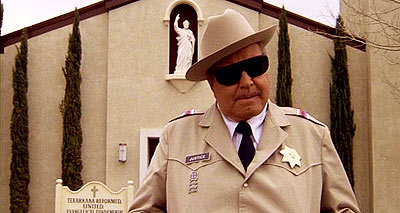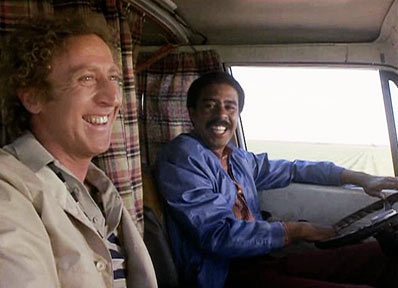Time, See What’s Become Of Me
Published on November 29th, 2010 in: Editorial, Issues, Three Of A Perfect Pair |Back when I was 12, liking a certain band could get you in trouble. I remember that my classmates were almost violently divided between who was better: Adam Ant or Ozzy Osbourne. As a fan of the former, I was frequently the object of considerable disdain.
(more…)
Communications With Aliens: Q&A With Dr. Richard Doyle, Penn State
Published on November 29th, 2010 in: Issues, Music, Q&A, Science and Technology, Science Fiction, Three Of A Perfect Pair |By Emily Carney
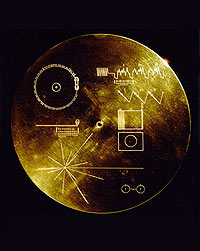
The original Voyager Golden Record
Recently, Popshifter reviewed the release Scrambles of Earth from Seeland Records. This recording consists of sounds from The Voyager Golden Record (sent into space on Voyager I and II in 1977 as sort of a message to extraterrestrials and as a space “time capsule”) allegedly remixed by some sort of extraterrestrial beings. The original record consisted of songs from all over the Earth, greetings from various then-contemporary world leaders, greetings in assorted foreign languages, and 116 images of Earth life.
I recently conducted a brief Q&A with Dr. Richard Doyle, English faculty member of Penn State University, about the various transmissions which comprise this audio recording. Dr. Doyle has been described as a “Rhetorician of Alien Communication,” so I had no doubt that his answers would be enigmatic and curiosity-arousing at best. Dr. Doyle did not fail to surprise me with his answers from our brief interview.
(more…)
When Three Is Neither Company Nor A Crowd: Least Favorite Love Triangles On TV
Published on November 29th, 2010 in: Comedy, Issues, Movies, Three Of A Perfect Pair, TV |By Maureen
I’m not a fan of love triangles. I’ve never been involved in one, and neither has anyone I know. The modern television writer, however, seems to think that love triangles are so commonplace a situation that shows feature them frequently. Usually I am able to ignore them, but three particular examples in recent memory come to mind as especially aggravating. In the spirit of the “power of three,” here they are.
(more…)
Seinfeld: You Got To Have Three
Published on November 29th, 2010 in: Comedy, Issues, Three Of A Perfect Pair, TV |By AJ Wood
Comedy duos are always the front of our minds, as though funny only happens in pairs: Lucy and Desi, Burns and Allen, McCain and Palin. For me, as typified in that first sentence, three is the funniest of numbers: one and two set up the pattern and three knocks them down. Works every time.
What becomes even funnier is using the same structure on top of itself: having three different series of three gags which are each funny on their own, but funnier still when they come together to form something greater. Something like a comedy turducken: nothing is left to idle stuffing; it’s just meat on meat on meat. Or perhaps as a vegetarian, I should say a comedy Voltron, with powerful parts coming together to make something more. Or maybe I should stop giggling over the fact I just wrote “meat on meat on meat” and “powerful parts coming together” and move on to the next slide.
One of the best examples of seamless tripartite comedy writing comes from an unassuming source: the show about nothing, Seinfeld. Running from mid-1989 through the 1997 TV season, this sitcom created by Jerry Seinfeld and Larry David offered something fresh and different from more typical sitcom formats. While “about nothing,” it was still quite unlike anything else on the air. One well-known episode from the early years setting this show apart was “The Chinese Restaurant” (Season 2, Episode 11): a continuous 22 minutes of Jerry, Elaine, and George waiting for a table in a restaurant. Pretty standard fare for a one-act stage comedy perhaps, but definitely not the realm of the typical sitcom.
(more…)
Terrorists, Tours, And Tourette’s: Season Three Of Curb Your Enthusiasm
Published on November 29th, 2010 in: Comedy, Issues, Three Of A Perfect Pair, TV |By AJ Wood
Season Eight of Curb Your Enthusiasm will be starting soon, and I will of course be watching. No matter what it brings, it will be difficult for it to reach the brilliance of the third season, which aired in 2002.
Not that episodes from seasons before and after the third one have not been great in their own regard: Porno Gil’s dinner party, opening night of The Producers, and of course, a wrestler named Thor. But as a whole, the third season brings the best mix of those three things that make CYE such a comedic goldmine: impossibly bizarre situations, a wonderful supporting cast, and some great insights into the mind of Larry David.
(more…)
My Heart Belongs to Jackie: Smokey and the Bandit II
Published on November 29th, 2010 in: Action Movies, Comedy, Issues, Movie Reviews, Movies, Retrovirus, Three Of A Perfect Pair |By Eric Weber
As a connoisseur of horror and cult films, one might think that I would have absolutely zero interest in the action/comedy series Smokey and the Bandit. For one, the movies are all about trucks and cars, which does not appeal to me at all; and secondly, the smart-alecky, “good ol’ boy” humor can quickly become annoying.
Luckily, the movies are graced with a great cast of actors that make all of these macho hijinks watchable. I am definitely a fan of Burt Reynolds; I think he has a really good sense of humor about his image and is a legitimately funny guy. Sally Field is, of course, cute and perky. Yet the adorable Jerry Reed seems to be the unsung hero of the series with his infectious smile and charming personality. These performers enhance the second movie in the series, Smokey and the Bandit II, by taking what could have easily become a plodding and simple car chase movie and making it one of my favorites
Then we have Jackie Gleason.
Don’t Give Up: Go Stir Crazy
Published on November 29th, 2010 in: Comedy, Issues, Movie Reviews, Movies, Retrovirus, Three Of A Perfect Pair |By Jemiah Jefferson
“I only have one speed: balls out.”
One of the essential films of my childhood was released in 1980, and I am almost completely certain that I saw it in the theater, being an avid fan of both Richard Pryor and Gene Wilder by the age of eight. Besides hearing Pryor’s comedy albums, I had also been lucky enough to catch Silver Streak on late-night TV as a wee one, and I most absolutely had seen The Wiz in the theater, and loved the hell out of it. And I am fairly certain I came out of the womb as a fan of Gene Wilder; no one can prove otherwise.
It Runs Like A Dream: Used Cars
Published on November 29th, 2010 in: Comedy, Issues, Movie Reviews, Movies, Retrovirus, Three Of A Perfect Pair |By Cait Brennan
It’s hard to believe that once upon a time, at least in mainstream studio movies, gross-out comedy pretty much didn’t exist. The Motion Picture Production Code dutifully garroted impure creative expression from the early ’30s through most of the 1960s, and when the Code was finally broken, New Hollywood spent ten years making mirthless character studies about sexually dysfunctional bank robbers, suicidal Vietnam casualties, and internecine crime syndicates. There were hints of what was to come in movies like Michael Ritchie’s The Bad News Bears, but for the most part, auteur baby-boomer navel-gazing was the order of the day.
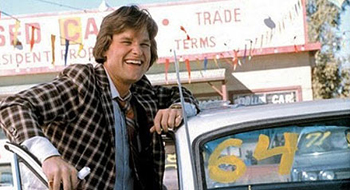
All that changed in July of 1978, when a no-budget frat comedy called Animal House belched its way into theatres with no real stars and zero expectations. It grossed over a million dollars a week and ran for a year and a half. Like a flatulent Trinity explosion, Animal House set off a raunchy-comedy arms race, with every studio in Hollywood frantically green-lighting anything with a dick joke. 1979’s Meatballs struck more box office gold, and by 1980 the marketplace was near-flooded with “adult comedies” from Airplane! and Caddyshack to the Tony Danza/Fran Drescher classic The Hollywood Knights. Even Mad magazine tried to copy their effete Ivy-League “betters” with the nakedly imitative Up The Academy (directed, almost beyond the limits of human credulity, by Robert Downey, Sr.)
In a year like that, it’s not surprising that a great movie might have gotten lost in the crowd. One did, and it might be the best of the bunch: director Robert Zemeckis’ 1980 comedy Used Cars. Zemeckis’ second feature (after his inventive and joyous Beatles tribute I Want To Hold Your Hand), Used Cars stars Kurt Russell and Jack Warden in a merciless send up of American corruption in the pre-Reagan era, with a razor-sharp script penned by Zemeckis and Bob Gale.
(more…)
But I Don’t Wanna Be In The Army: Private Benjamin
Published on November 29th, 2010 in: Comedy, Feminism, Issues, Movie Reviews, Movies, Three Of A Perfect Pair |By Emily Carney
Being a Navy veteran, I have an abiding interest in military-themed films of any sort, so I decided to re-watch 1980’s Private Benjamin. While it’s no G.I. Jane (perhaps the greatest female-in-the-military film, in which we see Demi Moore become the baddest, hardest Navy SEAL ever), it does have its hilarious moments (and its anxiety-provoking, PTSD-inducing moments, for me).
(more…)
Billy Joel, Glass Houses
Published on November 29th, 2010 in: Issues, Music, Music Reviews, Retrovirus, Three Of A Perfect Pair |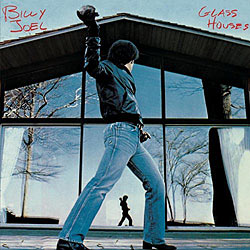
My first “grown up” album was Barry Manilow Live, which I received as a Christmas present when I was five. My sister Summer’s interest in rock and roll started at an earlier age; she was so obsessed with Billy Joel’s Glass Houses album that she received it for a present when she was two.
I read a lot of music magazines when I was a kid, and though I can’t recall the specific ones that criticized Glass Houses, I recall that it was a bit of a deal-breaker for Billy Joel’s fans. One of the most vocal critics was my then-stepfather Larry, who thought Joel spent too much time trying to sound like other musicians on the album and not enough time just being himself.
(more…)
